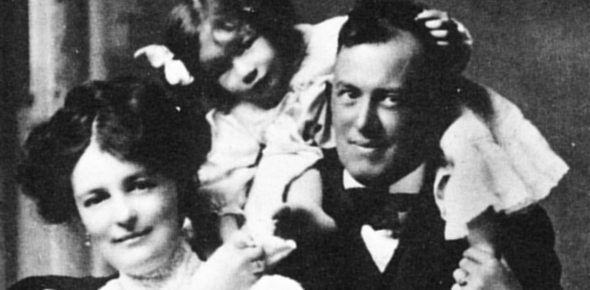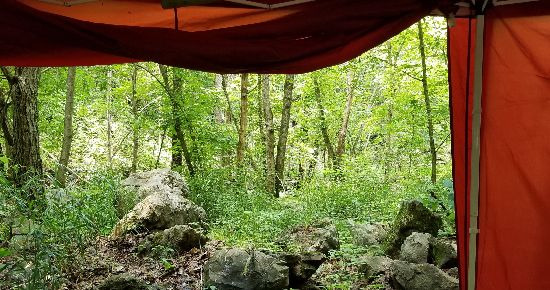Aleister Crowley was determined to impress his new wife, Rose (nee Kelly). For their honeymoon he planned a world tour. He showed off his big game hunting prowess. He organized a night in the King’s Chamber of the Great Pyramid where he performed a goetic invocation. One night in their Cairo flat he invoked the sylphs. Rose began to speak, saying “they are waiting for you.” This happened again the next night. On the third night the message clarified: “He who waits is Horus.” To test the channel Aleister took Rose to the Cairo museum and asked her to point out Horus. She led him to the funerary stele of the priest Ankh-f-n-khonsu which depicted the composite Ra and Horus, Re-Horakty.
This began the working that founded Thelema. Rose instructed Crowley how to perform a spring equinox ritual to Horus. Then she informed him that the entity who was instructing her was not Horus but Aiwass. A few weeks later Rose instructed Crowley to prepare himself to take dictation. For three days the entity Aiwass dictated to Crowley the three chapters of the Book of the Law.
Crowley came to understand himself as the reincarnation of Ankh-f-n-khonsu and eventually took the name Aiwass as the name of his Holy Guardian Angel. Even in his last years he continued to puzzle at the nature of the entity. Was Aiwass discarnate? Had he been a human being, possibly Assyrian? Crowley decided he did not know.
If all this seems extraordinary to us now it is because we have forgotten how important Spiritualism was as a religion. At the time Rose and Aleister were performing their workings there were eight million Spiritualists in America and England. In upper class drawing rooms all across the English speaking world women and men sat down at tables to communicate with the spirits of the dead.
Both women and men developed as mediums, but women were known to pick up the techniques more quickly.
In The Darkened Room Alex Owen traces some of the reasons Spiritualism attracted women in large numbers. The medium received messages from spirits; this played into the Victorian understanding of gender, contrasting the genteel passivity of upper class women with the coarse activity of working class women as well as masculine will-power. Laced into the corset of upper class morality, confined to the home and a narrow band of interests and influence, upper class women discovered they could escape these strictures in Spiritualist trance. Women rapidly assumed positions of power in a religion that validated feminine authority.
Edwardian occultism was an upper class phenomenon; the artists, actors, poets and writers who became magicians often lived on their own or other people’s inheritances. Upper class women held positions of authority not only in Spiritualism, but also in Theosophy, the Golden Dawn, and Ordo Templi Orientis. In the magical orders women and men engaged in visionary work in trance and in dreams, talking to spirits and flying from their bodies to visit one another and explore astral realms.
Interestingly, although their techniques were similar, many occultists took pains to distance themselves from Spiritualism. Anna Kingsford received visions which her scribe Edward Maitland recorded, but she held that these came not from discarnate human beings but from her own higher angelic self. The Golden Dawn also objected to the loss of consciousness involved in Spiritualism, where mediums could relinquish control of the body to the possessing spirit. The Neophyte Obligation from 1988 specified, “I will not suffer myself to be hypnotized, or mesmerized, nor will I place myself in such a passive state that any uninitiated person, power, or being may cause me to lose control of my thoughts, words or actions.”
Although both women and men received occult visions, in the magical orders it was very common for a conscious man to conduct the working with a woman in trance. There is some indication that Moina Mathers channeled rituals for the Golden Dawn under the direction of her husband Samuel Liddell MacGregor Mathers. In The Hermetic Brotherhood of Luxor Godwin et. al. list other couples who created occult texts through operations led by the man and channeled by the woman, including William Butler and Georgie Yeats, Laurence and Mary Oliphant, and Mary Ware and Max Theon.
In this context then it is unexceptional that Rose would fall into a trance during one of her husband’s workings and it was not unusual that she would dictate a ritual to him. Context also helps us recover the nuances of the working. A Pagan today would expect the ritual to be given by the deity Horus; a ceremonial magician would expect Crowley to receive dictation from his Holy Guardian Angel. But Rose heard Aiwass too, and Aleister kept the possibility open that Aiwass had been Assyrian. Remembering the importance of Spiritualism helps us make sense of that part of the story. The religious and occult milieu in which the Crowleys moved allowed for fluid exploration of the world of the spirit.
What we lack is Rose’s own description of her experience. Crowley said he heard Aiwass speaking from behind his shoulder. Did Rose? When did she know the voice was not Horus – when did he speak his name? What did she think the voice represented? Did she also experience the entity as her Higher Self? Did she hear it even when her husband wasn’t making an invocation? Did she hear it later in life? When she said “they” are waiting for you, who else was speaking?
It appears Rose did not practice magic in the same way that her husband did. In the historical record she appears as the perfect passive participant, speaking only to pass along messages. In her post-Aleister life she did not appear to continue to associate with magicians. If she left diaries or letters these have not reached print; she didn’t seem to leave any kind of record of her work. She may not have thought of it as hers at all, just as most biographers and magicians today treat the working as Aleister’s and not Rose’s. But she shared the experience, and we would know more about Thelema if we had her perspective on it.
Read more:
Rose and Aleister Crowley: Richard Kaczynski, Ph.D., Perdurabo
Spiritualism and women: Alex Owen, The Darkened Room and The Place of Enchantment
Neophyte obligation: David Griffin, Astral Masters and the Golden Dawn
Occult couples: Joscelyn Godwin, Christian Chanel, and John P. Deveney, The Hermetic Brotherhood of Luxor




A fine article, Brandy. When doing research for my workshop on Victorian Occultism, I became immersed in the history of spiritualism, and I’m still there! Here’s a link, in case anyone wants to check out my thoughts on this relationship. http://www.academia.edu/13974272/The_Victorian_Occult_Explosion_Expanded_Version_
This is a great overview! I’ll cite it next time I write about this 🙂 Did you know the Spiritualists are alive and well? My friend Bill Duvendack is a Spiritualist minister, I recommend his work: http://418ascendant.com/about